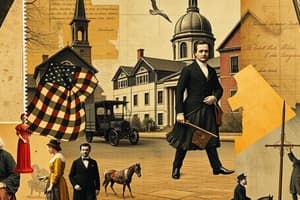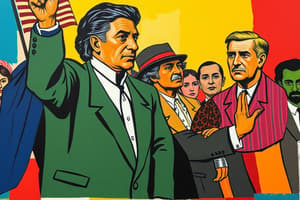Podcast
Questions and Answers
To what extent was this era good?
To what extent was this era good?
This era was good, since people generally felt optimistic and patriotic, but it didn't last very long.
Explain how Parson Mason Weems' fictional story of a young George Washington chopping down a cherry tree illustrates a cultural trend of the time.
Explain how Parson Mason Weems' fictional story of a young George Washington chopping down a cherry tree illustrates a cultural trend of the time.
It shows the patriotic themes many of the art and literature had, painting Washington in a wholesome, heroic fashion.
How did the tariff of 1816 differ from the tariff in Hamilton's Plan during the early 1790's?
How did the tariff of 1816 differ from the tariff in Hamilton's Plan during the early 1790's?
These tariffs were to protect the U.S from foreign competition. Hamilton's tariffs were to collect revenue.
Was Henry Clay more Hamiltonian or Jeffersonian?
Was Henry Clay more Hamiltonian or Jeffersonian?
Why did Monroe veto road and canal projects?
Why did Monroe veto road and canal projects?
How did the panic of 1819 impact American voters?
How did the panic of 1819 impact American voters?
Although the nation was united under a single political party, division emerged resulting in the eventual development of new parties. Compare the causes of these divisions to the causes of the Hamilton and Jefferson division in the 1790s.
Although the nation was united under a single political party, division emerged resulting in the eventual development of new parties. Compare the causes of these divisions to the causes of the Hamilton and Jefferson division in the 1790s.
To what extent were these forces similar?
To what extent were these forces similar?
To what extent was westward expansion responsible for increasing sectional conflict?
To what extent was westward expansion responsible for increasing sectional conflict?
Explain how a 19th century American pioneer would view 'acquiring American Indian land' as justifiable.
Explain how a 19th century American pioneer would view 'acquiring American Indian land' as justifiable.
Support, refute, or modify the following statement: Henry Clay was the Great Pacificator and the Great Compromiser.
Support, refute, or modify the following statement: Henry Clay was the Great Pacificator and the Great Compromiser.
Did Jefferson see the Missouri Compromise as a success?
Did Jefferson see the Missouri Compromise as a success?
Explain why President Monroe and Secretary of State John Quincy Adams pursued a more aggressive foreign policy.
Explain why President Monroe and Secretary of State John Quincy Adams pursued a more aggressive foreign policy.
To what extent were relations between the United States and Great Britain more positive in the Era of Good Feelings than they were during the 1780s and 1790s?
To what extent were relations between the United States and Great Britain more positive in the Era of Good Feelings than they were during the 1780s and 1790s?
What was more significant to the growth and development of the United States, John Quincy Adams' accomplishments as Secretary of State or the military accomplishments of General Andrew Jackson?
What was more significant to the growth and development of the United States, John Quincy Adams' accomplishments as Secretary of State or the military accomplishments of General Andrew Jackson?
With the issuance of the Monroe Doctrine, was America a world power?
With the issuance of the Monroe Doctrine, was America a world power?
Compare the population in 1840 to the population in 1790.
Compare the population in 1840 to the population in 1790.
Flashcards are hidden until you start studying
Study Notes
Nationalism and Economic Development
- This era was marked by optimism and patriotism, although it was short-lived.
Cultural Trends
- Parson Mason Weems created a fictional narrative surrounding George Washington, emphasizing patriotic themes through his portrayal as a heroic figure.
Tariffs
- The Tariff of 1816 aimed to protect U.S. industries from foreign competition, contrasting with Hamilton's early tariffs that primarily sought to generate revenue.
Political Ideologies
- Henry Clay aligned more with Hamiltonian ideals through his support for a strong central government, national banks, and protective tariffs.
Monroe's Vetoes
- President Monroe vetoed road and canal projects due to his strict interpretation of the Constitution, which did not support federal infrastructure development.
Panic of 1819
- The economic panic led voters to oppose the national bank and debtors' prisons, increasing calls for reform.
Political Divisions
- New political divisions arose in a united political environment, reflecting deeper disagreements over policies rather than foundational government structures like during the Hamilton-Jefferson divide.
Sectional Conflict and Expansion
- While sectional conflicts predated westward expansion, the latter heightened tensions as both Northern and Southern states feared political marginalization.
Pioneer Perspectives
- 19th-century pioneers justified acquiring American Indian land, viewing them as adversaries due to conflicts stemming from previous wars.
Henry Clay's Role
- Henry Clay earned the title "Great Compromiser" for crafting the Missouri Compromise, which balanced interests of the North and South in Congress.
Jefferson and the Missouri Compromise
- Thomas Jefferson viewed the Missouri Compromise as a success for maintaining the union and peace between Northern and Southern states.
Aggressive Foreign Policy
- Monroe and John Quincy Adams pursued a proactive foreign policy to enhance American interests and establish the nation as a global power.
U.S.-Britain Relations
- Relations with Great Britain improved during the Era of Good Feelings compared to the 1780s and 1790s, exemplified by the Rush-Bagot Agreement and the Treaty of 1818.
Impact of John Quincy Adams
- John Quincy Adams' achievements as Secretary of State, especially with the Monroe Doctrine, significantly impacted U.S. growth and development.
Monroe Doctrine's Effectiveness
- The Monroe Doctrine did not elevate the U.S. to a world power status; international compliance stemmed more from fear of Britain rather than respect for America.
Population Growth
- A notable population increase occurred from 1790 to 1840, reflecting demographic changes over half a century.
Studying That Suits You
Use AI to generate personalized quizzes and flashcards to suit your learning preferences.




